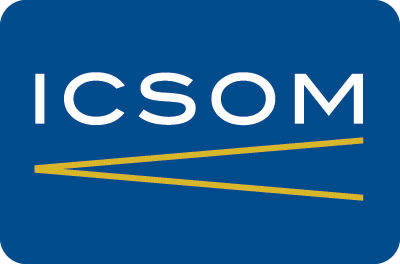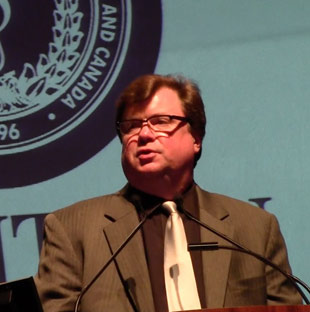



June 20, 2016, Las Vegas
View the video of this speech on Youtube here.
Good afternoon friends and colleagues,
In October of 1963, President Kennedy set forth his vision for the future of the arts when he spoke at Amherst College, saying:
"I see little of more importance to the future of our country and our civilization than full recognition of the place of the artist. I look forward to an America which will reward achievement in the arts as we reward achievement in business or statecraft. I look forward to an America which will steadily raise the standards of artistic accomplishment and which will steadily enlarge cultural opportunities for all of our citizens."
Kennedy's inspiring message, delivered less than a month before his tragic assassination, recognized the value of the artist in society, and yet more than fifty years later we have to ask ourselves if his vision has been realized. In so many ways it appears his words have been neglected, and the greatest threat to a thriving future for the arts in America is the persistent and often unchallenged negative rhetoric about the future of the arts in America.
This negative view has been around a very long time. We have articles with headlines that proclaim "25 Symphonies Doomed to Die" which would be of more concern if the articles were not published in 1970 and if not for the fact that all the orchestras destined for doom remain vital today.
We have a document written by the president of the board of the Chicago Symphony, who said:
"The (Chicago Symphony) now must solve a problem which has arisen from economic conditions beyond its control. A deficit has been incurred, and undoubtedly there will be annual deficits for some years to come. This affects the future of the orchestra…(and) our problem does not differ in kind from the financial problem that faces each of the major orchestras in the United States."
This is especially troubling isn't it? …that an orchestra as great as the Chicago Symphony could face this predicament. I would be more alarmed had this not been written in April, 1940.
Despite all of this negativity, our orchestras continue to thrive in a difficult economic environment. This season alone, the musicians of the Nashville Symphony earned a 10.9% raise over two years, and the musicians of the Kansas City Symphony earned raises that amount to nearly 20% over the term of their new contract. The Indianapolis Symphony received a $10 million gift and the New York Philharmonic received a $25 million dollar gift. The Omaha Symphony saw record breaking attendance, and the Chicago Symphony saw record breaking ticket sales.
The latest studies show that charitable giving to the arts rose 6.8% in 2015. Music is now a part of federal education policy, the economic impact of the arts for our cities is widely recognized, music therapy is increasingly being accepted as treatment for numerous medical conditions, and soon an opera singer, Marian Anderson, will be honored on United States currency.
And yet, seemingly inexplicably, the negative perception remains.
The musicians of ICSOM's newest member, the Grand Rapids Symphony, recently completed a year-long negotiation, one where they fought off potentially devastating cuts by utilizing new techniques and mastering public relations messages that served to win the support of the entire community and change the negative viewpoints of their board. The musicians accomplished this all while building positive relationships that will serve them well into the future, and which led to the successful completion of a $40 million endowment campaign. But when this news was reported in the press, the articles began by declaring that other orchestras across the country are in decline, while offering no evidence of the veracity of such a misleading statement. Even articles that report on the incredible growth of the Los Angeles Philharmonic have begun with the same statement, as if somehow false negativity is a mandated doctrine of the press that covers our orchestras.
In this decade the musicians of ICSOM have endured numerous labor disputes, and outlasted a terrible recession. But they have not just endured, they have grown. They have stood against negativity, cultivated new techniques for negotiation and advocacy, and led the way in demonstrating how music is an inherent call for peace and inclusiveness. Increasingly our musicians are producing their own concerts that raise money for the hungry, provide inspiration for the homeless, and advance healing for the sick.
In an all-too-often violent world, the musicians of ICSOM stand united in proclaiming that every note we play, every lesson we teach, every concert we perform is a statement against violence and a statement for unity and peace in the world.
We believe we have brought this unity to ICSOM by articulating ideals to work for instead of only offering problems to work against, and we have sought to share this unity with the entire AFM. The musicians of ICSOM are nearly 99% organized, a claim that we doubt any other segment of this union could make. All the more remarkable is that this has been achieved even though 36% of our orchestras are in so-called "Right to Work" states. One must wonder if such orchestral solidarity with the AFM would be possible were it not for ICSOM.
When ICSOM tries to alert the leadership of the AFM to issues and problems that could prove divisive if not addressed, it is the most pro-union and pro-AFM endeavor a member could undertake. But too often in recent years, our messages to the leadership of the AFM have been met with resistance. When we are visiting with the orchestral members of the AFM from San Juan to Honolulu, from Halifax to Victoria, we are learning the concerns and issues that affect the health of our orchestras, and the health of the families of our musicians.
To our members, it seems inconceivable that anyone could doubt that ICSOM is the best friend the AFM could ever have.
We must embrace our future as eagerly as we celebrate our past. To achieve anything in life you must first imagine it, and we can imagine a union that is stronger.
Imagine a union where our membership is growing and not declining. Imagine a union that inspires its members with a message of hope and inclusiveness that galvanizes musicians to want to join and participate. Imagine a union that stands as a beacon of peace and beauty in a time of universal unrest.
We must embrace new media, we must embrace new ideals, we must embrace new technologies, and we must be on the forefront of the astute and thoughtful use of the tools that the modern world has provided us.
We live in a media-driven world, where community relations campaigns are an essential part of any negotiation. Embracing new tools does not represent a surrender of tradition or solidarity; it represents a crucial step in the preservation of our many institutions. As the great composer Gustav Mahler once wrote, "Tradition is not the worship of ashes, but the preservation of fire." Should we fail to offer this message of hope to our members and to the entire world, we will be left clutching nothing more than a fistful of rain.
In our troubled world, a world that often slumps with the weight of its burdens, humanity will always persevere in the face of violence, and music will forever be a response to hatred. The great violinist Bronislaw Huberman, a man responsible for saving thousands of Jewish musicians from the Holocaust through the creation of the Palestine Symphony, once wrote that "The true artist does not create art as an end in itself. He creates art for human beings. Humanity is the goal."
Imagine a union that spreads this message of hope far beyond its membership. That is the union I imagined in those early days in Norfolk, Virginia, when I was 15 years old and my teachers took me to get my first union card at Local 125. Now, as I prepare to step away from my position as Chair of ICSOM this August, a position I have been honored to hold longer than anyone before me, a union of hope remains the union I imagine is possible to achieve.
I want to thank you all for the friendship and support you have shown me in this decade. After all of this time I still believe even more deeply in the message of hope that ICSOM has articulated for this union. I have no doubt that by effectively sharing a vision of the hope for the world that all music provides, and by standing as a beacon of peace, and by truly inspiring our members as the united network of friends that they are, the AFM can become the union that we all have always imagined.
Thank you very much,
Bruce Ridge
Follow ICSOM on Twitter at https://twitter.com/ICSOM
On Facebook at https://www.facebook.com/ICSOM

ICSOM Chairman Bruce Ridge